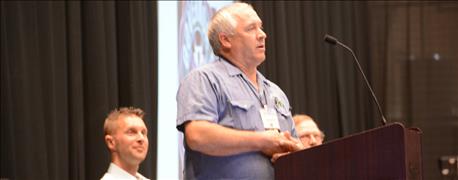June 3, 2016

No-till, drip tape irrigation and the magic of manure were among the things that farmers on a panel at the South Dakota Ag Summit said they were doing to improve their businesses and conserve natural resources.
Mark Rilling, Pierre, S.D., said he cut his water use by two-thirds and more than doubled yields of melons, tomatoes and other produce by replacing a conventional irrigation system with an underground drip tape system. More farmers could use this kind of technology, he said.

John Moes talks about conservation program he used to improve his feeding operation as Mark Nigg looks on
John Moes, Florence, S.D., said he upped his cropland organic matter from 2.5% to about 5-6% by applying manure from his feedlot to the land. Runoff from the feedlot, which includes open lots and several monoslope barns, is completely contained. About 5 acres of trees protects the cattle from the wind disperses odors. “I am a good neighbor,” he said.
Louie Nigg, Peever, S.D, now no-tills 90% of his cropland and is experimenting with cover crops. He said no-tilling hasn’t caused any significant delay in when he can start planting compared to conventional-till neighbors. To reduce risk of fertilizer running off his land this year he applied only 50% of the nitrogen his corn needs at planting. He sidedresses or topdresses the rest after the corn is up and he has done some tests to see how much more N he needs to meet the yield goal given weather conditions.
Ag Summit participants were interested in how these farmers got started farming and what kept them going through tough times.
Moes, the seventh of 11 children in his family, moved away from the family farm and started his own operation from scratch. He told of working fulltime off the farm and farming through the evenings, nights and weekends to make ends meet. His wife worked off the farm, too.
“It was hard, but we had the passion for farming,” he said.
Rilling said got started in the 1980s when interest rates were high. He and his family just worked extremely hard and put in long hours. Much of the work in their produce fields is done by hand. He doesn’t look for help from government program to keep him on the land.
“Our destiny is in our hands,” said Rilling, who recently started direct marketing pork to consumers. He said all he would like people to do is eat more bacon.
Nigg joined his parents in family’s grain and cattle operation 19 years ago. His great grandfather started the farm in 1910. Nigg keeps framed copies the farm’s first couple tax returns on the wall of his office. It shows one year the farm made $500 and another year it lost $500.
Nigg says the tax returns remind him how far the farm has come and how fortunate he is to be part of it.
You May Also Like




